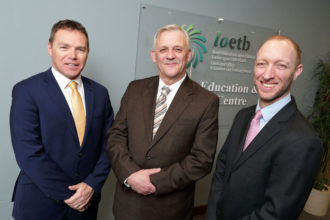Datapac and Swappsi streamline services and cut costs for Ireland’s Education and Training Boards

- Centralised records management system enables ETB staff to work with optimum efficiency and focus on providing high-quality education and training services
- Purpose-built web-portal enables schools and outcentres to submit documentation directly to ETB head office, increasing speed of approval process
Datapac, Ireland’s leading technology solutions and services provider, today announces that, together with its software partner Swappsi, it has developed and implemented a new centralised records management solution for Ireland’s Education and Training Boards (ETBs). The new system streamlines administrative processes for the ETBs, allowing them to focus on better aligning education and training provision with the skills needs of the Irish economy.
Together, the ETBs manage one third of all second level schools in the country, as well as further education colleges and adult education centres. They are responsible for the education for over 100,000 students throughout Ireland.
The 16 ETBs were formed when 33 Vocational Education Committees were amalgamated to reduce costs and increase efficiencies. This led to a number of challenges, including the potential duplication of software systems for performing administrative functions such as organising payments to suppliers and managing student grants and payroll.
The ETBs contacted Datapac to design a solution to help them meet the various challenges of the mergers. Following a comprehensive assessment, Datapac contacted its partner Swappsi to develop a customised software solution to consolidate VEC data in a primary ETB database and cleanse redundant or duplicate records. As part of the project, new telecommunication links were installed to provide remote ETB offices with direct access to the new single database at head office. To enable remote offices to submit administrative documentation Swappsi also developed a purpose-built web portal.
Each ETB now has a unified central database that supports staff in their efforts to work with optimum efficiency. This new system architecture has also reduced ICT support costs as the number of Local Area Networks and associated software systems required by the ETBs has been greatly reduced. The web-portal designed by Swappsi has also proved to be extremely successful, and is currently in use by over 11,000 users at 400 education centres and offices around Ireland. The web portal enables ETB staff and students to quickly and easily submit expenses, coursework, and a range of other documentation.
Denis Hackett, software systems manager, Education and Training Boards, said: “The amalgamation of the VECs involved merging multiple ETB offices, their software systems, and their telecommunication networks, across various geographical locations. This required that the existing ICT infrastructure be re-configured to enable the ETBs to continue providing high quality educational and training services. This was a complex and demanding project that could not have been completed without Datapac’s knowledge, expertise and commitment, and Swappsi’s particular skillset.”
Gonzalo Faura, CEO, Swappsi, said: “Enabling the ETBs to work at maximum efficiency required the development of a bespoke software solution to streamlining their databases. Swappsi was delighted to play a key role in this undertaking and lead the development of the software programmes that facilitated system integration across the ETBs, as well as the web portal which is used by 11,000 students and staff. We look forward to continuing to work with the ETBs going forward to ensure that they get the most out of their new systems.”
Richard Murphy, head of business solutions division, Datapac, said: “Right from the outset we were really excited by the scale and ambition of this project. Ireland’s ETBs provide lifelong learning services to everyone, including adults and children of all ages. To do this they require a robust and reliable infrastructure to be able to continue to deliver these valuable services every day.
“We look forward to working closely with the ETBs in supporting the new unified systems, and on any future projects that assist the ETBs in achieving their objective which is the provision of high-quality education and training services to their local communities.“
